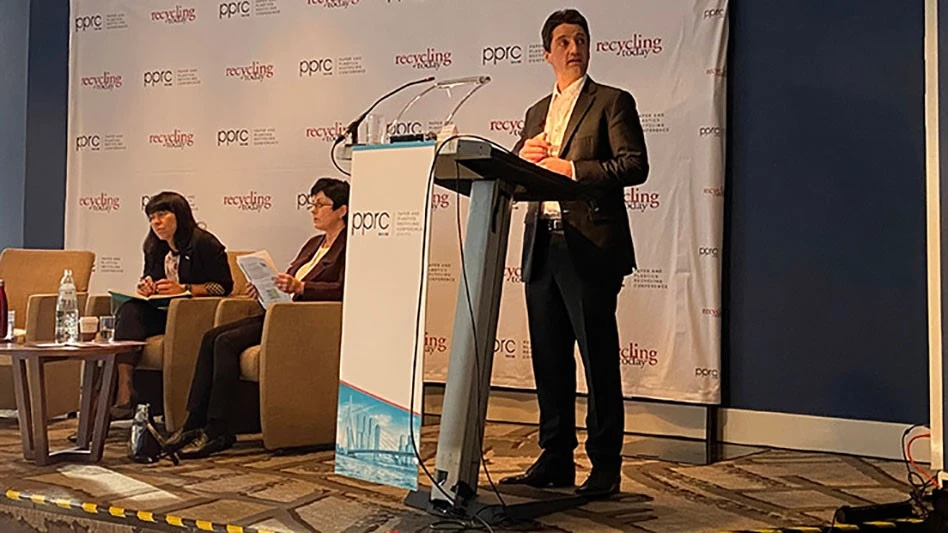
Recycling Today archives
Government and corporate goals are aligning to support fully recyclable packaging, according to panelists at a session on the topic at the 2022 Paper & Plastic Recycling Conference Europe, which was held in Rotterdam.
Although the world’s major institutions, supported by the public, are in favor of recyclable packaging, challenges and differences remain as to the blend of positive and negative reinforcement recommended to bolster recycling. Also up for debate is to what extent government should be involved in deciding where recycling takes place and whether it should remain a global industry.
Surveys referred to by consultants Susan Cornish of United States-based Insight + Action LLC and Sébastien Ricard of Havas Paris showed consistent support for recycling and recyclable packaging by household consumers in Europe and elsewhere.
While activist groups and nongovernmental organizations (NGOs) may be willing to formulate policies on circular economy issues, Cornish said surveys in the United States show the public is “looking for companies to take the lead [to] develop packaging that is more sustainable.”
Ricard, pointing to a European survey, said 90 percent of that poll’s respondents say they expect private companies to provide the means to reduce their carbon footprints via recyclable choices and other techniques.
Regarding plastic pollution, the “lowest rate of answers” was from those “expecting activist associations, NGOs to solve the issues,” said Ricard. “Industries and household consumers are expected to be the ones with the responsibility to solve the plastic pollution crisis; it’s them together.”
What about the recyclers and traders gathered for the conference? “Sorting specialists and recycling companies are not expected to be the ones with the biggest responsibility or power to take actions,” said Ricard.
He said this could be in part because “people and consumers know sorting and recycling [firms] are already acting.” Ricard said the replies also could point to something else: “It also shows that in terms of communication, recycling companies can emerge as a problem solver more than expected.”
Cornish and Ricard also showed examples of new packaging styles, most of which use recycled-content materials, but several of which may not be fully welcome at material recovery facilities (MRFs) or paper mills.
Jurgita Girzadiene, sustainability manager with Ireland-based containerboard and packaging producer Smurfit Kappa Group (SKG), said that firm’s 20 recycled-content board mills are an established part of Europe’s recycling infrastructure.
Nonetheless, the company has spent the past 15 years establishing and revising sustainability-related goals with an eye on innovation as an answer. “I am very proud that I am part of the innovation team (at SKG),” said Girzadiene. “To us, innovation is closely linked to sustainability. If we just continue to do what we are today, we will end up where we are today.”
Girzadiene said SKG’s Better Planet Packaging program has been established “to support our customers in transition from nonsustainable, multimaterial packaging with low recycling rates to more sustainable packaging. I don’t say we have solutions for everything, but we have solutions in many, many areas that can be implemented today.”
The old corrugated containers (OCC) recycling grade resulting from SKG’s core product is a recyclability leader, but delegates in the session’s audience urged SKG and other European mill companies to refrain from putting regulatory barriers in the way of OCC’s global trade.
Stated one delegate in the audience, “We don’t as an industry want to export commingled waste. Our industry invests a lot of money to produce OCC and other grades accepted by CEPI [the Confederation of European Paper Industries]. Please don’t think our industry wants to export materials to non-OECD [Organization of Economic Cooperation and Development] materials that [are] a waste. It is a product. No one is asking us to export commingled waste.”
Francisco Donoso of Spain-based Dolaf Servicios Verdes, who also is current president of the Bureau of International Recycling (BIR) Paper Division, said there is “plenty” of OCC in Europe, but not enough demand there, “So it becomes waste unless we export it. Export should be promoted, therefore.”
While panelists and delegates expressed disagreement on how to maximize the recycling rate of OCC and other forms of packaging, they did find broad agreement on a definition offered by Girzadiene: “There shouldn’t be such a concept as waste. Waste is raw material in the wrong place at the wrong time. Waste has very bad [connotations]—nobody needs it, nobody wants it, nobody wants to pay for it.”
The 2022 Paper & Plastics Recycling Conference Europe event was Nov. 15-16 at the Hilton Rotterdam in the Netherlands.
Get curated news on YOUR industry.
Enter your email to receive our newsletters.
Latest from Recycling Today
- Unifi launches Repreve with Ciclo technology
- Fenix Parts acquires Assured Auto Parts
- PTR appoints new VP of independent hauler sales
- Updated: Grede to close Alabama foundry
- Leadpoint VP of recycling retires
- Study looks at potential impact of chemical recycling on global plastic pollution
- Foreign Pollution Fee Act addresses unfair trade practices of nonmarket economies
- GFL opens new MRF in Edmonton, Alberta





